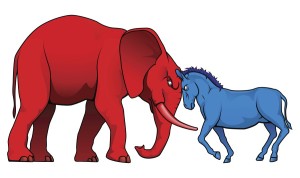In the previous post, The Meaning of America, I attempted to distill a list of the core ideas and values that gave rise to our distinctly American culture—that uniquely American way of doing things that was eloquently described by de Tocqueville in the 1830s and is still recognizable today. I called this “the American core,” and then added that “this American core is under sustained attack, and it may not survive. A new culture is emerging, rooted in different core ideas. Old institutions are failing, or are being redefined or replaced. Things are messy, tense, and often uncivil.”
This begs the question: what exactly are these different core ideas?
Here’s how I would presently sum up this new set of ideas and values. You might call it “the emerging core” although in reality, these ideals and values have become firmly established throughout much of American society.
- The rejection of a transcendent, objective reality and moral order (combined with a hostility and intolerance towards orthodox Judeo-Christian religions).
- Radical autonomy. The individual is the sovereign maker of meaning. The state and other cultural institutions exist to equip each individual with as much “freedom” as possible so as to assert his or her own account of meaning.
- The rule of man: The state is the ultimate definer and guarantor of human rights and the Constitution is continually adapted to align with the evolving definitions
 , understandings and worldview assumptions of the ruling elite.
, understandings and worldview assumptions of the ruling elite. - The state is the fundamental “community” to which we belong, and as such, it rightly provides the goods and services formerly supplied by civil society (families, and religious, educational and charitable institutions).
- Societal problems (poverty, crime, corruption, etc.) are the result of unjust and unequal social systems and structures. The common good is advanced through enlightened social policy, and systemic and structural reforms overseen by a class of managerial and technocratic elites.
- The quest for equality of outcomes is an overriding good.
- The amassing, wielding and retaining of cultural power though the crafting and promotion of narratives whose effectiveness is based on distortion and emotional appeal.
- A highly controlled economy built primarily around the mutual interests of the state and powerful corporations.
- Comfort, entertainment, and immediate gratification are valued as a means of distraction from the emptiness and purposelessness of life.
President Obama has promoted a new vision of America
This emerging core isn’t exactly new. These ideas and values are an outgrowth of a secular worldview that reaches back at least as far as the European Enlightenment. However, they have become pervasive and mainstream today, particularly in academia, the media, entertainment, and urban centers on both coasts.
 Politically, this emerging core is championed by The Progressive Movement within the Democratic Party. Whether the Republican Party will continue to be the political home for conservatism—that is, preserving the older core—is very much in doubt.
Politically, this emerging core is championed by The Progressive Movement within the Democratic Party. Whether the Republican Party will continue to be the political home for conservatism—that is, preserving the older core—is very much in doubt.
President Obama will likely be remembered as the first American president to fully embrace this emerging core and consistently govern by it. Indeed, his overarching agenda can be described as an attempt to replace the older core with the emerging core, which explains his promised “fundamental transformation” of America during his first campaign. The president has used his bully pulpit to effectively advocate this new understanding of America. One of his speechwriters described the “entire job” of Ben Rhodes, one of the president’s top communications advisors, as assisting the president in affecting a “larger restructuring of the American narrative.”
Some of my evangelical friends will, no doubt, resist the binary nature of “two lists,” the older core, and the emerging core. Isn’t there a great deal of middle ground between them? Why can’t they be combined, mixed and matched?
They can, but I would argue that doing so is fraught with inconsistency and incoherence because each list “holds together” as a logical outworking of its first principles.
The first principle of the older list is: “the acknowledgement of a transcendent moral order.” This is the soil from which the subsequent ideas and values naturally flow. In the same way, the first principle of the emerging order is “the rejection of a transcendent, objective reality and moral order.” Each of the subsequent ideas and values flows logically from this starting point.
 These two “first principles” can be likened to a tap root of a tree. If the tap root is that of an orange tree, there will be continuity between the roots, the trunk, branches and fruit the tree bears. Oranges will naturally be produced from the root of an orange tree.
These two “first principles” can be likened to a tap root of a tree. If the tap root is that of an orange tree, there will be continuity between the roots, the trunk, branches and fruit the tree bears. Oranges will naturally be produced from the root of an orange tree.
Now if you wish, you can tape apples to an orange tree, but there is a profound illogic to it. The root produces the fruit. Both lists flow naturally from their first principles, and will inevitably lead to very different kinds of lives, and different kinds of societies and cultures. Despite America’s many failures and shortcomings, the older core produced one of the freest, most tolerant, and prosperous nations in human history. What kind of society will the emerging core produce? We are discovering that right now, and we will learn much more in the near future.
- Scott Allen






